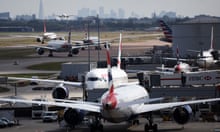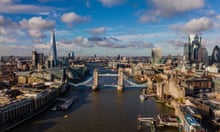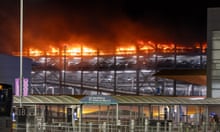Almost 500 “ghost flights” a month departed from the UK between October and December 2021, data has revealed.
The information, obtained through a freedom of information request by the Guardian, shows Heathrow, Aberdeen, Manchester, Stansted and Norwich were the top five airports for such flights during the period.
Ghost flights are defined as those with no passengers, or less than 10% of passenger capacity. The data from the Civil Aviation Authority includes only international flights leaving the UK and not arrivals, or any domestic flights.
Flying is one of the most carbon-polluting activities people can undertake, and ghost flights have angered those campaigning for action on the climate crisis. Almost 15,000 ghost flights left the UK between the start of the Covid-19 pandemic in March 2020 and September 2021, the Guardian revealed in February. The German airline Lufthansa said in January it would have to fly 18,000 “unnecessary” flights by March.
Such flights have been blamed on the system at busy airports whereby airlines must normally run 80% of their flights, empty or not, to retain their landing slots. The rule was suspended during the pandemic and reintroduced at 50% in October 2021, but that did not appear to have significantly changed the number of monthly ghost flights.
Tim Johnson, of the Aviation Environment Federation, said: “UK airline average occupancy grew significantly in the last six months of 2021, although November’s peak at around 70% is still significantly below the 86% achieved before the pandemic. But this hasn’t altered the number of ultra-low occupancy flights in our skies each month.
“If changing market fortunes can’t solve this problem then the government must act to do so,” he said. “Its recent claim earlier that aviation can be net zero by 2050 while accommodating a 70% increase in passenger numbers (from 2018 levels) stretches belief when there are such obvious examples of inefficiency in the current system. Fixing these should be a priority.”
The government regulates aviation but no data is made public on the number of ghost flights. Only the airlines know the true number, but have not provided this data when asked by the Guardian.
“The public deserves transparency,” said Sarah Olney the Lib Dem MP and transport spokesperson. “They are not getting it from an industry keeping this nefarious practice hush-hush, and ministers have to share the blame for this serious vacuum of accountability. A government review into ghost flights is long overdue.”
Alex Sobel, a Labour MP and chair of the net zero all-party parliamentary group, said: “Although international travel has recovered somewhat, and there’s no need to fly empty planes to hubs or for maintenance, airlines don’t seem to have given up their climate-degrading practice of ghost flights.”
A parliamentary petition calling for an end to such flights has been signed by 14,000 people.
The Department for Transport said: “We acted swiftly [during the pandemic] to prevent empty aircraft needing to fly to retain their slots, however some flights may operate with low passenger numbers for a whole range of reasons, including carrying key workers or vital cargo.”
Airlines UK, the trade body for UK-registered airlines, said: “The [CAA] figures reflect two things – refreshed travel restrictions to combat the Omicron variant, leading to flights from destinations like Morocco and the far east bringing UK travellers home. Passenger aircraft have also been widely used as freighters during the pandemic, and even though these flights are carrying essential freight and supplies, including PPE, they would be inaccurately classed as ‘ghost flights’ in this analysis.”









